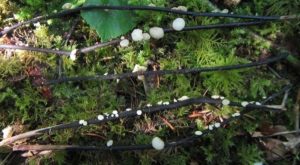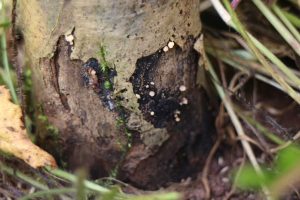Summary
This completed project aimed to elucidate the characteristics and behaviour of the ash dieback pathogen Hymenoscyphus fraxineus, with particular focus on pathogen sporulation and infection strategy. It also explored the interaction between ash dieback affected trees with species of root-attacking fungi from the genus Armillaria that are commonly found in woodlands and tree corridors. This knowledge is required for more accurate disease modelling and management.
Research Objectives
- Determine the effects of climate and environment on fraxineus sporulation.
- Investigate the conditions which affect spore germination.
- Establish the consequences of different fraxineus spore densities on host infection and disease intensity.
- Detect and identify the Armillaria species on trees affected with ash dieback and how this might influence tree survival.
General Content
Background
Ash dieback disease, caused by the ascomycete fungus Hymenoscyphus fraxineus, is currently causing mortality of European ash (Fraxinus excelsior) throughout Europe. The fungus is dependent on its sexual cycle to produce fruit bodies known as apothecia – these form on fallen ash leaves the year after infection and actively discharge spores (ascospores) for aerial dispersal. The ascospores complete the disease cycle when they infect healthy ash leaves during the summer.
Results

This study monitored apothecia development during two consecutive summers at seven woodland sites across England and Wales. It revealed that mean temperature, mean relative humidity, ground cover and tree canopy openness, all interacted together to affect apothecia development. There was a positive relationship with temperature, and this was enhanced with higher relative humidity and the sheltering effect of ground vegetation which is often more developed under open tree canopies. In contrast, fewer apothecia developed when ash leaf litter was on bare ground or when ground vegetation was reduced, probably because under these conditions there is more exposure to solar radiation and a less humid environment. The threshold for apothecia development was found to be around 10 °C, whilst mean daily temperatures of up to 22 °C associated with high moisture particularly favoured apothecial development.

Various studies indicate a circadian clock in H. fraxineus that leads to early morning spore ejection although the timing and quantity of spore release is also heavily influenced by weather conditions. We found ascospores were more likely to be ejected from apothecia under conditions of high relative humidity and temperature, with maximum spore densities generally detected from July to mid-August. When high numbers of H. fraxineus colonised ash leaves accumulated in the litter layer in autumn, it resulted in an increase in the number of apothecia and ascospores produced the following summer, which in turn increased crown dieback severity. The study also showed that the ascospores of H. fraxineus could germinate under a range of temperatures (5 °C – 30 °C), but that a small drop in humidity hindered germination.

Some ash dieback affected trees were also found to develop lesions caused by H. fraxineus at their base. Armillaria (honey fungus) then invaded up to 90 % of these basal lesions, and usually it was the less pathogenic species of honey fungus A. gallica, but occasionally the more pathogenic species A. mellea was found. Ash dieback crown symptoms were not noticeably worse in trees with Armillaria basal lesions, and in some the crown symptoms were negligible, indicating that ash dieback affected trees may become hazardous due to Armillaria root rot, even when crown dieback due to H. fraxineus is not advanced.
Status
Completed. This research was undertaken between October 2017 and April 2021.
Funders and partners
This project is undertaken in the form of a post-graduate studentship which was a joint enterprise between Forest Research and the School of Biosciences, Cardiff University. Funding came jointly from Defra, the Woodland Trust and Network Rail which formed a steering group for the project.
Forestry Commission policy
This project is aligned with other research on ash dieback funded by the Forestry Commission which underpins the evidence base for the delivery of healthy and resilient forests and wider ecosystems (see Tree Health Management Plan).
